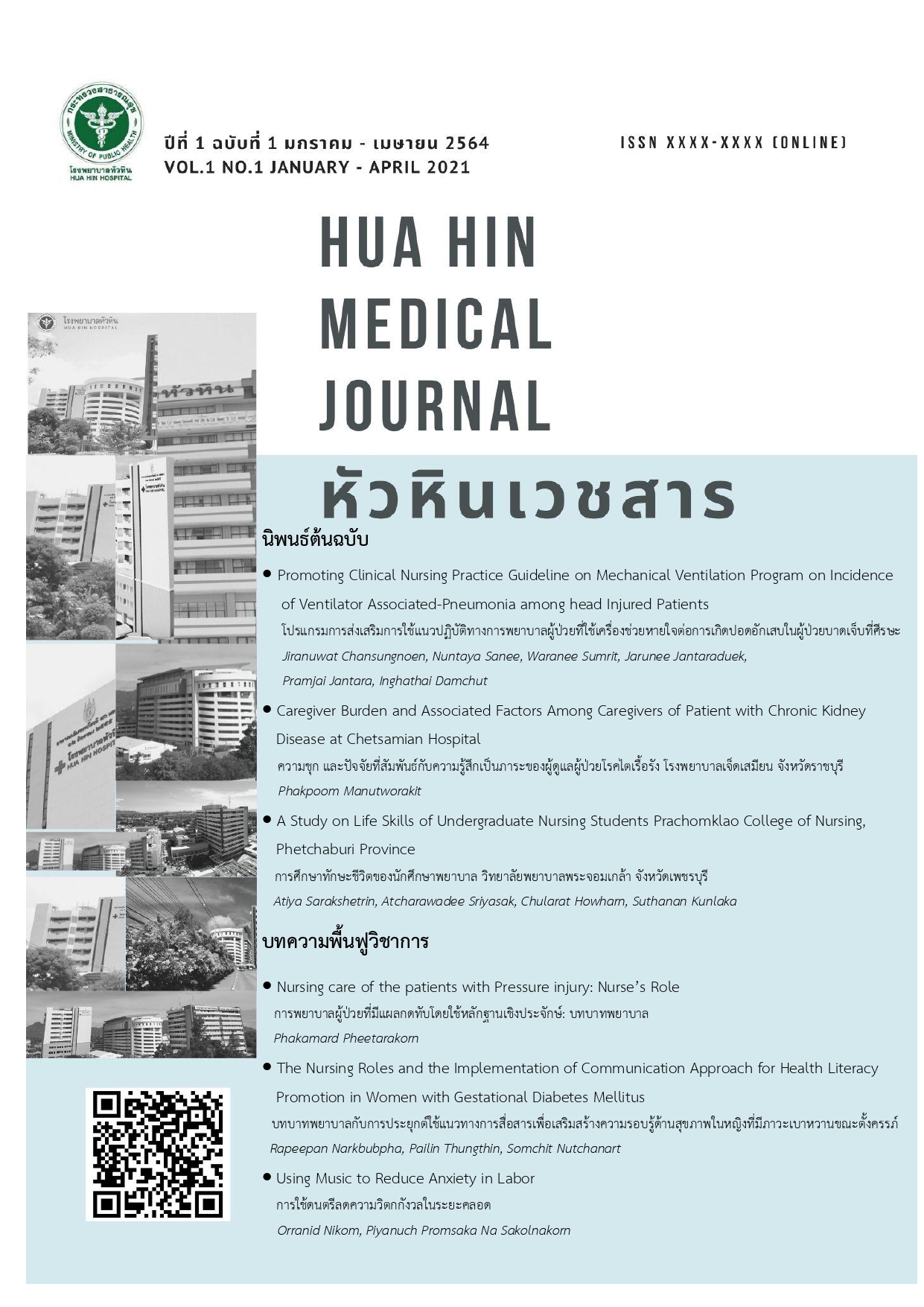A Study on Life Skills of Undergraduate Nursing Students Prachomlao College of Nursing, Phetchaburi Province
Keywords:
Life skillsAbstract
This research aimed to: (1) study life skills of nursing students and (2) compared mean scores of life skills among nursing students with different family factors. The sample groups in the study were Year 1-4 nursing students studying at King Mongkut's College of Nursing Phetchaburi Province, academic year 2019, 180 students. research instruments were the life skills assessment of adolescent students. The instrument reliability was obtained with a cronbach value of .91. The data was analyzed using mean and standard deviation and the difference on mean scores of life skills among nursing students with different family factors were testing by independent t-test.
The result found that Nursing students were high overall life skills (M = 4.02, SD = .34), with high social skills, the highest individual mean (M = 4.07, SD = .34), followed by skills. Emotional coping and thinking, respectively (M = 3.99, SD = .43; M = 3.88, SD = .42), compared the mean scores of life skills among the graduate nursing students with different family factors. Male students had more life skills average scores than female students. The second child students had the highest life skills average score.
References
Pipattanawong, W. (2018). Life Skill of Thai Teen in 21st Century. PAYAP UNIVERSITY JOURNAL, 24(2), 39-63.
Voracharoensri, S. (2007). A Study of life and training model consruction foe developing life skills of adolescent student. Doctor of Education Degree in Counseling Psychology at Srinakharinwirot University. (In Thai)
Keawtong, S. (2013). Somes factor affecting to skills of Mathayomsuka Vstudents in the Secondary education service office area II. Veridian E-Journal, 6(3), 443 - 460.
Phothidara, Y. (2011). Nursing Education Management : For Student Generation Y. Journal of Nursing Science & Healt, 34(2), 61-69.
Poolporm, W & Panthuchin, C. (2009). Life skills and adjustment of adolescents (first year students) in the faculty of Nursing, Khon Kaen University. Journal of Nursing Science & Health, 32(1): 36-44.
Khumtorn, L. & Suwanvela, S. (2019). The Relationship Between Social Support and Life Skills among Nursing Students in Boromarajonani collage of Nursing, Trang. Journal of Department of Health Service Support, 14(1), 54 - 68.
Jiramanaswong, A., Howharn, C. & Wannatawee, P. (2020). A Study on Life Skills of Undergraduate Nursing Students Boromarajonani College of Nursing, Surin, Nursing Public Health and Education Journal, 21(1), 139-165.
Phuipha, T., Bunthumporn, N. & Vuthiarpa, S. (2018). The Effect of A Life-Skill Training Program on The Depressive Symptoms of Senior High School Students. Journal of The Royal Thai Army Nurses, 19(Special), 89- 98.
Naeim, N., Rahimi, H. R., Soltani, F., Farazandeh, F., Nejad,, F. M., Sharafi, M. R., et al. (2016). The role of life skills and self-efficacy in mental health among male students in High school. International Journal of Medical Research & Health Sciences, 5(7s), 118-126.
Janjaroen, K & Nakaramontree, S. (2016). The Relationship Between Social Support and Life Skills among Nursing Students. The Southern College Network Journal of Nursing and Public Health, 3(2), 85-99.
Sota, J. (2011). Concepts theories and application for health behavioral development. Faculty of Public Health Khon Kaen University.(In Thai)
Saichamchan, S., Skulkhu, J., Potisuk, A., & Yongsorn, C. (2015). Development of Training Program to Enhance Life Skills for The Royal Thai Air Force Nursing Students. Journal of The Royal Thai Army Nurses, 16(2), 21-29.
Buvaneswari, R., & Sylvia, J. (2017). Assessment of Life Skills among First Year B.Sc. Nursing Students of Selected Nursing College, Tamilnadu. International Journal of Advanced Research, 5(9), 1007-1011.
Downloads
Published
How to Cite
Issue
Section
License
บทความที่ได้รับการตีพิมพ์ในวารสารหัวหินเวชสาร เป็นลิขสิทธิ์ของโรงพยาบาลหัวหิน
บทความที่ลงพิมพ์ใน วารสารหัวหินเวชสาร ถือว่าเป็นความเห็นส่วนตัวของผู้เขียนคณะบรรณาธิการไม่จำเป็นต้องเห็นด้วย ผู้เขียนต้องรับผิดชอบต่อบทความของตนเอง







